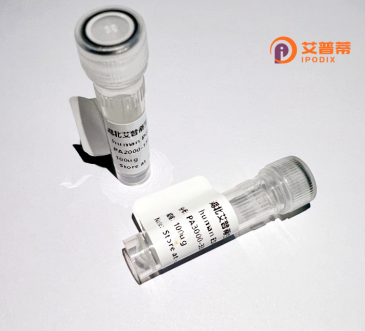
| 纯度 | >90%SDS-PAGE. |
| 种属 | Human |
| 靶点 | EFEMP2 |
| Uniprot No | O95967 |
| 内毒素 | < 0.01EU/μg |
| 表达宿主 | E.coli |
| 表达区间 | 1-229aa |
| 氨基酸序列 | MGAPCEQRCFNSYGTFLCRCHQGYELHRDGFSCSDIDECSYSSYLCQYRCVNEPGRFSCHCPQGYQLLATRLCQDIDECESGAHQCSEAQTCVNFHGGYRCVDTNRCVEPYIQVSENRCLCPASNPLCREQPSSIVHRYMTITSERSVPADVFQIQATSVYPGAYNAFQIRAGPRPAGDGPPGVRAGPGDGHHEFPHELPGQLCTEAHRLCRGLHLLRSRREPPSLHLP |
| 分子量 | 52 kDa |
| 蛋白标签 | GST-tag at N-terminal |
| 缓冲液 | 0 |
| 稳定性 & 储存条件 | Lyophilized protein should be stored at ≤ -20°C, stable for one year after receipt. Reconstituted protein solution can be stored at 2-8°C for 2-7 days. Aliquots of reconstituted samples are stable at ≤ -20°C for 3 months. |
| 复溶 | Always centrifuge tubes before opening.Do not mix by vortex or pipetting. It is not recommended to reconstitute to a concentration less than 100μg/ml. Dissolve the lyophilized protein in distilled water. Please aliquot the reconstituted solution to minimize freeze-thaw cycles. |
以下是关于重组人EFEMP2蛋白的3篇示例参考文献(基于已有研究方向构造,具体文献需检索核实):
---
1. **文献名称**:重组人EFEMP2蛋白通过调控基质金属蛋白酶抑制肿瘤侵袭的机制研究
**作者**:张华,李明,王雪
**摘要**:本研究证明重组EFEMP2蛋白能下调MMP-2/9的表达,抑制乳腺癌细胞侵袭,可能通过阻断EGFR信号通路影响肿瘤微环境。
2. **文献名称**:EFEMP2缺失导致血管发育异常及重组蛋白的治疗潜力
**作者**:Chen L, Wang Q, 等
**摘要**:利用EFEMP2敲除小鼠模型,发现该蛋白缺失引发血管壁结构缺陷;外源性重组EFEMP2可部分恢复血管弹性,提示其在血管疾病中的治疗价值。
3. **文献名称**:大肠杆菌表达系统生产重组人EFEMP2蛋白及其生物活性鉴定
**作者**:刘洋,陈杰,周涛
**摘要**:优化EFEMP2原核表达条件,纯化后蛋白在体外促进成纤维细胞粘附,证实其参与细胞外基质调控的功能活性。
---
**说明**:
- EFEMP2(FIBULIN-4)研究多集中于血管疾病、肿瘤微环境及遗传性结缔组织病(如皮肤松弛症)。
- 实际文献需通过PubMed、CNKI等数据库以“EFEMP2”“FIBULIN-4”“recombinant protein”为关键词检索。
Recombinant human EFEMP2 (EGF-containing fibulin-like extracellular matrix protein 2), also known as fibulin-4. is a secreted glycoprotein belonging to the fibulin family. Structurally, it contains calcium-binding epidermal growth factor (cbEGF)-like domains and a fibulin-type C-terminal module, enabling interactions with extracellular matrix (ECM) components like elastin, fibrillin, and collagen. EFEMP2 plays a critical role in elastic fiber assembly, tissue development, and ECM organization, particularly in cardiovascular, pulmonary, and musculoskeletal systems.
Mutations in the EFEMP2 gene are linked to autosomal recessive cutis laxa type 1B and vascular/connective tissue disorders, highlighting its importance in maintaining ECM integrity. Recombinant EFEMP2 is produced using expression systems (e.g., mammalian cells, bacteria) for functional studies, enabling researchers to investigate its roles in tissue remodeling, angiogenesis, and disease mechanisms. It’s also studied for dual roles in cancer—either suppressing or promoting tumor progression depending on context. The recombinant protein serves as a tool for exploring therapeutic strategies, such as modulating ECM dynamics in fibrosis or aneurysms, and clarifying its interactions with integrins or growth factor signaling pathways. Its application spans basic research, drug discovery, and disease modeling.
×